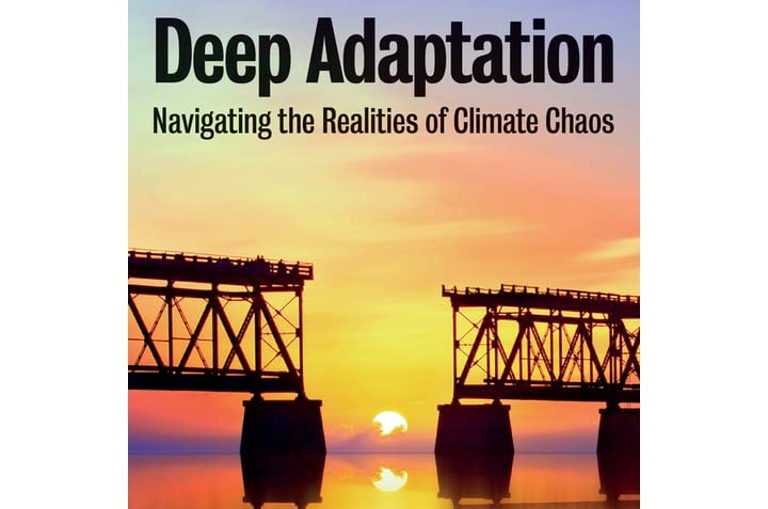Soon it will be a year since the book I co-edited on ‘Deep Adaptation’ to the coming breakdown of industrial consumer societies, mainly due to environmental stress, was published by Polity. Over that year, the idea of societies breaking down has become a little less taboo within research circles, with the emergence of terms like ‘polycrisis’ to describe the contemporary situation where a variety of societal disruptions are interacting – health, inflation, conflict – to threaten the capability of people, organisations and governments to comprehend and respond. Despite that progress on the fringes of intellectual thought, there is still widespread resistance to even discuss the topic, which was reflected by many of the book reviews of Deep Adaptation. A particular type of negative review has emerged from the Left of British politics, which has been surprising to me given my involvement with the British Labour Party prior to 2018. Such reviews reflect a concern of some left-wing commentators that if we do not believe it possible to reform modern economies to produce a sustainable future of ‘Life as We Know It,’ then we would not find motivation for longterm political organising to gain government power. This concern is something I will focus on in this review of the reviews. But first, I want to begin with a review that also expressed concern for mutual solidarity, and considered the Deep Adaptation agenda more realistic than the mainstream concept of sustainable development, which pretends we can have our capitalism cake and eat it.
In that review in World Literature Today, one criticism of the book is that it is academic and not that accessible to a wider audience. Edited by two academics, we are guilty as accused! Part of that wider accessibility, the reviewer said, would be to show ways that people can respond to their anticipation of societal breakdown, including as citizens and political actors. I think that is an important invitation for people in the Deep Adaptation movement and anyone who no longer believes that we can maintain ‘Life as We Know It’ (in middle class urban societies), as environmental breakdown unfolds.
It is clear that a few years since the start of the Deep Adaptation phenomenon, there is a bifurcation between people who want to focus on emotional support and those who want to connect that to attempting social change at scale. In its first 3 years, the work of the Deep Adaptation Forum (DAF) has been mostly serving the former tendency, so that attempts at social change are undertaken by participants in the Forum through their various other social activism. Since last year, as an outsider, I have been encouraging the Forum to support more social activism, including more public advocacy on compassionate responses to societal disruptions and perceived vulnerabilities. I do that while knowing that any policy ideas, advocacy and activism can become a form of escapism, and repeat patterns of thought and behaviour that got us into this mess in the first place. Therefore, we need to maintain a focus on emotional processing when doing such work. That is why we began by exploring new ways of engaging in dialogue at the outset of the DAF. It would be a mistake to assume, as some observers have done, that this emphasis on psychology is at the expense of political organising, or for participants in the DA movement to believe that focus should be instead of political organising.
What is already clear is that an anticipation of societal collapse does not mean less social activism, or less radical critiques of how we arrived in this mess. In a public letter at the conclusion of the COP26 conference in Glasgow, over 200 scholars from around the world who anticipate societal disruption and collapse due to climate change, together condemned the corporate capture of climate policy. With the co-editor of the Deep Adaptation book, Dr Rupert Read, we critiqued the corporate takeover of COP26 in an article for Brave New Europe. In our book itself, capitalism was mentioned 16 times as an unhelpful barrier to significant action on mitigation and adaptation. Since we finished that book, I have been researching what various policy ideas might make sense in a world that’s increasingly disrupted by environmental and associated changes. To contrast with the corporate reformist agenda at COP26, I published a series of articles about a bolder policy agenda on both mitigation and adaptation (a #RealGreenRevolution). These included monetary reform, stock market reform, a global carbon tax, breaking up media and tech monopolies, nationalising food reserves, and a range of other necessary and obvious left-of-centre policy ideas.
Although it’s not surprising that such ideas do not appear in the corporate mainstream climate policy agenda, it is unfortunate that supposedly more left-wing or the more devoutly environmental publications and commentators have not been promoting similar ideas. Instead, I witness their policy proposals rely on technological salvation, better management of corporations and more intrusive controls on the general public. Whereas such proposals are sometimes accompanied by people posturing as true radicals, the contents of books like Burnt, show they are reformist, not revolutionary. I also witness some environmentalists continuing to pretend their demands are ‘Beyond Politics’ whereas without massive wealth redistribution, their ideas would have terrible impacts on the low income people in their countries. Such redistribution would require a huge amount of organising to win elections, despite mainstream media and bigtech being fundamentally opposed to any kind of economic radicalism.
Unpacking One Critical Review
Perhaps the lack of a radical comprehensive programme, a sense of political impotence, and a fear of how bad things are becoming, all mix together to produce rather aggressive commentary on the Deep Adaptation book and movement from some commentators on the Left. I will examine one review in particular to highlight this phenomenon. In the Ecologist magazine, a champion of the British Labour Party’s proposals for a Green New Deal to decarbonise the UK economy called the book many bad things, including defeatist, anti-humanist, and primitivist. Why such hostility? That is something I will come back to. But first, I want to address those three accusations.
The argument that to anticipate the collapse of industrial consumer societies is defeatist seems logical to some on the face-of-it. However, the wave of bold activism by people who believe it is too late to avert a catastrophe, and are trying to help societies change to reduce harm and provide more of a chance to each other and future generations, is empirical evidence that apathy is not the response by many people. The book describes a range of actions being undertaken, but perhaps we could have done more to show the global movement that it now is. For instance, the humanitarian action taken by people in the Deep Adaptation group in Southern India, or the efforts at local food production in Hungary. It is only defeatist if one only has one vision of victory, which is maintaining industrial consumer societies. Such a singular vision must ignore worrying interpretations of the latest environmental science, as well as ignore the ecological footprint of greening the economy in the way proposed by ideas like Labour’s proposed Green New Deal – a topic which deserves some serious attention before moving on to the subsequent criticisms in The Ecologist’s review.
In 2021, the UN’s International Energy Agency (IEA) calculated that a global energy transition off fossil fuels would increase demand for key minerals such as lithium, graphite, nickel and rare-earth metals by 4,200%, 2,500%, 1,900% and 700%, respectively, by 2040. The IEA report noted that there is not the capacity to reach such demand, whereas there are no plans to build enough mines and refineries, and such expansion is unprecedented and would take decades. Therefore, it does not appear to be a solution available to the whole world. The report also noted that the environmental impacts of delivering that level of supply would be massive. Such environmental impacts include not only the devastation from earth removal, but also the toxic and radioactive wastes produced from the mining and refining processes. Worse still, an analysis of where those critical minerals are located, finds they are typically in locations full of people living outside of industrial consumer societies that want the metals from under them. Academics Christos Zografos and Paul Robbins therefore concluded in a study published in the journal One Earth, that “A Green New Deal could put severe pressure on lands held by Indigenous and marginalized communities and reshape their ecologies into “green sacrifice zones.” Such cost shifting risks reproducing a form of climate colonialism in the name of just transition.” For a Green New Deal to work to decarbonise any modern economy means that a country must maintain the unequal global relations that both generate its purchasing power in world markets and enable international corporations to destroy the lands of indigenous and marginalised peoples around the world. By pointing out these contradictions and the potential for new waves of ecological destruction from the capitalist’s fairytale that is a ‘Green New Deal’, one is being both realistic and expressing solidarity with vulnerable people, not being defeatist. In other words, it is not defeatist to wish to defend the lands of indigenous people against the corporations seeking profit from fueling the privileged and unsustainable lifestyles of people on the other side of the world.
One of the other claims in the book review deserves more detailed attention, partly because it led to some furore online, and a specific objection from some contributors to the book. That is the claim that the book and the movement are ‘primitivist.’ In his article Chris Saltmarsh says little about what he means by that term, other than it involves promoting learning from ‘idealised’ indigenous societies. I want to note right away that the book includes some authors who are women of colour and one chapter is co-written by a collective of indigenous scholars. As Skeena’s chapter on relocalisation was quoted as part of Chris’s argument, she spoke out against the use of such language:
“There are deeply meaningful reasons why we would consciously refuse technologies of the west that are not about our ‘lack’ or “primitivism” but instead our abundance of mind, heart and spirit. When people of non-western and whiteness cultures resist the technologies of the west, often people racialised as white and people programmed in whiteness will use a kind of gaslighting of our ancient cultures – and will make an assumption that what we ‘need’ and want most is the so called ‘progress’ which in reality is often the mal-adaption of the west.”
I have since been told that Chris meant that the book had a theme of ‘anarcho-primitivism’ running throughout it. That made me visit wikipedia to find out what that is all about. Apparently it is an “anarchist critique of civilization that advocates a return to non-civilized ways of life through deindustrialization, abolition of the division of labour or specialization, and abandonment of large-scale organization and high technology”.
The Deep Adaptation book does not advocate anarcho-primitivism. The book neither mentions the term nor cites the author who created and promotes the term – an American philosopher called John Zerzan. Instead, the book outlines how Deep Adaptation is an invitation for exploring what to do once we stop pretending we can reform and save industrial consumer societies. Therefore, as a framework, it does not advocate the active destruction of such societies. Conversely, the book includes advocacy of technologies, such as safe forms of geo-engineering like localised Marine Cloud Brightening that uses sea water, and the use of open source software to create local trading networks, ideas that are likely heresy for anarcho-primitivists.
The book critiques both modernity, capitalism, and consumerism in various places. Although anarcho-primitivists do that, so do mainstream environmental groups, Christians, Buddhists, Sufis, and whole swathes of social and political thought, such as post-modernism. The book includes world leading Buddhist scholars, leadership scholars, and educational theorists. It is strange to me how these could all be regarded as closet anarcho-primitivists.
Saltmarsh describes respect for indigenous cultures by Pablo Servigne and colleagues as “promoting an imagined primitive mode of social organisation” and manages to cover over any prejudice by criticising Servigne and friends for not discussing Indigneous struggles. Yet that chapter mentions how “Indigenous communities have been experiencing collapses for centuries…” Chris writes in his review there is a lack of solidarity with indigenous people in a book which has a chapter co-authored by a collective of indigenous scholars and activists. Moreover, that chapter explicitly critiques Western responses to bad climate news that use stories of returning to a pre-modern idyll, which they label as a “romantic” form of denial. In other words, in a chapter written by indigenous scholars in the book, the way Western people might be attracted to anarcho-primitivism is critiqued.
Despite claiming that is what he meant by the term primitivism, Chris does not mention anarcho-primitivism in his book review. If he had, then people with an interest in anarcho-primitivism might have paid attention, and been disappointed not to find any of that in the Deep Adaptation book. Instead, Chris appears to use the term ‘primitivism’ and ‘primitive’ in his article as a negative label, rather than as a label for a political ideology. Therefore, I share the concern of my colleagues about such forms of writing in a key environmental publication in 2022. It should not need to be women of colour or indigenous scholars who call out white writers and editors for their use of racially insensitive language. As Skeena’s co-author, Matthew Slater said in his rather fruity public letter to Chris:
“Given that you, me and the editor of The Ecologist are all white men, we should listen to how such statements come across to people unlike us.”
It would be unfortunate if what is actually happening here is the reviewer avoiding accountability for his pejorative use of the term of primitivism, by invoking – post hoc – a marginal political theoretical idea that not only is not present in the book, but the sentiment of which was actually criticised in that book.
The casual use of negative labels is something that can have real world consequences. In Brazil the current political establishment has a diabolical attitude towards the indigenous peoples of the Amazon. They are struggling against rapacious capitalism, including that which fuels the demand for precious metals for the technologies of the modern world, as I described above. Would someone trying to stop a bulldozer trashing a tropical forest to access the critical mineral to drive Green New Deals in the West be labelled anarcho-primitivist? Or only if they mention that they critique the values of modernity and consumerism that underpin the violence of that bulldozer? Perhaps for some people, anyone that gets in the way of the possible techno-salvation of industrial consumer societies is worthy of any negative label that might stick?
Which brings us to the claim by Mr Saltmarsh that we are ‘anti-humanists’. He does that by quoting me and the co-founder of the Climate Psychology Alliance, Adrian Tait, out of context, to suggest we simply blame the human race for the mess the planet is in, rather than recognising the role of capitalism in driving the predicament. But in his chapter Adrian writes: “The economics of plunder and incursion has fed a set of myths and assumptions – for instance the notion that it is fine to externalise costs – to dump them into the global commons. These myths and assumptions are denial systemically enshrined; they blind us to the situation or encourage us to accept it as inevitable.” That sounds like a critique of the economic system. If he missed it, then this statement in the book’s introduction was clear enough: “The deep adaptation perspective sees the pace and scale of dangerous levels of climate change and ecological degradation to be so fast that neither a reform of capitalism or of modern society is realistic.” In sixteen other places in the book there is a criticism of capitalism as a driver of the predicament we are in. However, in every instance, as with Adrian, we go deeper, beneath capitalism, and critique industrialism and consumerism as well. Perhaps that is our real ‘sin’ for the reformist Left in the West – we are too critical of capitalism, including of the systems that prop-up the vested interests who pay their wages.
Maintaining Our Faith in Each other During Disruption and Breakdown
It is disappointing that this question about the reasons for the predicament is so badly addressed in a review in a serious publication like The Ecologist. I see nothing in the article from Chris to suggest he was engaging in philosophical debate about the nature of humanism, and instead was simply implying we have a misanthropic, negative, view of human nature. What Chris and other critics do not recognise is that Deep Adapters are the people who argue against any negativity towards human nature within the ever-wider field of collapse anticipation. We recognise that some people who realise everything is falling apart and the environment has been destroyed can, in their grief and anger, arrive at a form of misanthropy. They can adopt a disdainful attitude towards our own species. That is an important issue to raise and discuss: to recognise the pain from which that attitude arises and then explore why we can choose to have a faith in humanity after all. Part of that process is to recognise what went wrong, and to see how people have been manipulated – and subjugated – by systems that served power. In my past writings I have gone further than Saltmarsh – I have argued that if environmentalists do not have a deeper critique of the oppressive systems that have manipulated and exploited us to harm each other and nature, then we may end up with a misanthropic view which sees humans as having created this mess because of human nature and that we need strict controls on our behaviour for our own good. Although I have mentioned this issue a lot in the past, it doesn’t seem to ‘cut through’. It is probably because I have avoided naming names and using the F word. So I will try to be clearer here…
If the environmental movement doesnt centre itself on a capitalist critique, it will become misanthropic and degrade into ecofascism when situations become really difficult. If the Left in the global North does not recognise it has inadvertently adopted the misanthropic assumptions of managerialism, whereby people must be given stricter rules by expert elites, then it will also descend into ecofascism. And if the lot of us don’t recognise the assumptions and values of modernity that also underpin this mess, we won’t be able to find agendas and narratives suited to an era of things getting materially more challenging for generations to come.
I won’t bore you with more debunking of the other criticisms in either Saltmarsh’s review or others from the British left. Instead, what is a more positive way of responding? It is to realise that all of us, including these critics of Deep Adaptation, are afraid. When afraid, it is normal to lash out. Therefore we can help each other to notice when that is happening through our frantic intellectual story-telling. In the case of some of these commentators from the British left, it might be their anxiety that is motivating them to delegitimize anyone who undermines their current story of salvation from this tragedy. Deep Adapters might therefore be seen as more of an enemy to them than the powers-that-be, as a story of salvation is what keeps them going, for now.
Recentering Freedom in a Politics for the Polycrisis Era
The negativity coming from some commentators on the British left is particularly odd for me, given my previous work with the Labour leader’s office during the General Election of 2017, when we managed to transform the country’s impression of Jeremy Corbyn and remove the government’s majority. The lack of wisdom and radicalism in the criticisms has helped me to see that there is an urgent need for a radical left agenda for an era of climate breakdown. That means going back to first principles. For me, the Left is about collective emancipation from systematic oppression, with an emphasis on people with less power organising together to achieve more. Such systematic oppression involves economic structures, as well as cultural norms associated with gender, ethnicity and class. Therefore, both freedom and fairness are foundational to Leftwing politics, despite the horrors of past decades when the Left became totalitarian, and the more recent decades where the Left in many countries has lost its confidence about its emancipatory character.
Such is the loss of focus on collective emancipation in contemporary mainstream Leftist discourse, when I discuss this topic with people in the West they are often surprised. Reclaiming the idea of freedom as part of the narrative of the Left was why, as communications strategist, I proposed the 2017 UK General Election campaign of the Labour Party use a narrative of freeing people from ‘being held back’ by the effects of the extreme inequality enabled by government policies. When discussing that, often the focus turns to what ‘freedom’ today means for the Left. So, in concluding, I would like to get a bit philosophical…
For me, freedom describes the elusive capability for people to continually re-discover and pursue personal preferences with an awareness of how that pursuit arises from, relates to and impacts, others and nature. That capability is influenced by personal, relational, societal and environmental contexts. Ultimately freedom must include a personal preference to cultivate one’s ability to comprehend how the process of preference-formation arises from attachment to stories of reality and to fears of many kinds, including a fear of suffering and death. It must also include a freedom from the potential tyranny of concepts, by realising that ‘freedom’ is merely a concept pointing in a general direction, and there is no singular and precise phenomenon in reality that constitutes ‘freedom’. A belief in emancipating people stems from a belief in our innate potential to do what is right for ourselves, each other and nature if we are not manipulated, incentivised or forced into destructive behaviours. That means the first instinct of a truly freedom-loving left winger is to identify the impediments to people naturally doing what is of mutual interest. Sadly, many of the commentators and leaders within the Leftwing of politics across the West appear to have forgotten that faith in people, as their ideas are infected by managerialist attitudes that regard the rest of us as needing more oppressive controls on our thoughts and behaviours.
Deliberation on the topic of emancipatory politics during societal breakdown is not something that should be led by me, my friends, or the wider British left. It needs far broader participation from people around the world, many of whom have experienced disruptions in recent memory, and who are less emotionally and economically invested in industrial consumer societies. Where might such a deliberation take place? Perhaps the World Social Forum, which brings together explicitly anti-capitalist civil society organisations from around the world could be a venue for a year long ‘Assembly on Emancipatory Politics for an Era of Polycrisis’. To explore that possibility, some Deep Adapters and signatories to the Scholars Warning will be participating in the 2022 World Social Forum. I look forward to hearing what creative ideas emerge, on both emancipatory policies and praxis in a time of polycrisis.
At some point, I hope that some of the current critics of Deep Adaptation, and anyone who has been misinformed by them, will help grow this emancipatory politics during societal disruption and breakdown. So I end with reflection with words of Skeena, a member of the Holding Group of the Deep Adaptation Forum:
“Let’s become free together. Let’s become safe together and maybe even find our flourishing together, for the very future of humanity and its cousins in the great web of life are depending on this work. Togetherness and the reunion of the whole human family is the only way – the true acceptance of our many ways of being. I call this work – Co Liberation. Come Chris Saltmarsh and friends, come around the fire, let us swap our stories of these ways of being and becoming, let us heal the wounds and tears this paradigm and system has inflicted on us. Let’s make kinship, let’s belong together and let’s love who we are and what we have left.”








 Hundreds of Ukrainians arrive from Lviv at Przemyśl train station in Poland earlier this week. Photograph: Alessio Mamo/The Guardian
Hundreds of Ukrainians arrive from Lviv at Przemyśl train station in Poland earlier this week. Photograph: Alessio Mamo/The Guardian



